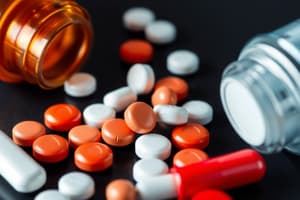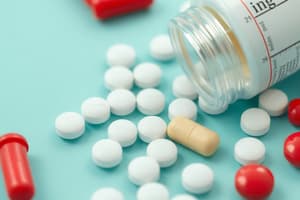Podcast
Questions and Answers
Which type of antihypertensive drug is primarily used to reduce cardiac output?
Which type of antihypertensive drug is primarily used to reduce cardiac output?
- Beta-blockers (correct)
- Calcium channel blockers
- ACE inhibitors
- Thiazide diuretics
What is the primary mechanism of action for thiazide diuretics in managing hypertension?
What is the primary mechanism of action for thiazide diuretics in managing hypertension?
- Reduced peripheral vascular resistance
- Inhibition of the renin-angiotensin-aldosterone system
- Increased sodium and water excretion (correct)
- Blockade of calcium channels
Which of the following classes of antihypertensive drugs is contraindicated during pregnancy?
Which of the following classes of antihypertensive drugs is contraindicated during pregnancy?
- Beta-blockers
- Calcium channel blockers
- Thiazide diuretics
- ACE inhibitors (correct)
How does angiotensin II primarily affect blood pressure?
How does angiotensin II primarily affect blood pressure?
Which subtype of angiotensin receptors is most closely associated with increases in blood pressure?
Which subtype of angiotensin receptors is most closely associated with increases in blood pressure?
What is the primary treatment of choice for managing hypertension during pregnancy?
What is the primary treatment of choice for managing hypertension during pregnancy?
Which of the following medications is contraindicated during pregnancy for treating hypertension?
Which of the following medications is contraindicated during pregnancy for treating hypertension?
In a hypertensive emergency, which intravenous medication is effective for acute management?
In a hypertensive emergency, which intravenous medication is effective for acute management?
What characterizes primary (essential) hypertension?
What characterizes primary (essential) hypertension?
Which class of antihypertensive medications typically ends with the suffix '-dipine'?
Which class of antihypertensive medications typically ends with the suffix '-dipine'?
What type of hypertension is indicated by normal readings in a doctor's office but elevated readings elsewhere?
What type of hypertension is indicated by normal readings in a doctor's office but elevated readings elsewhere?
Which class of medications is often utilized to inhibit the Renin-Angiotensin-Aldosterone System (RAAS)?
Which class of medications is often utilized to inhibit the Renin-Angiotensin-Aldosterone System (RAAS)?
What is a common treatment for secondary hypertension caused by obstructive sleep apnea?
What is a common treatment for secondary hypertension caused by obstructive sleep apnea?
Which class of antihypertensive drugs should be avoided in patients with bronchial asthma?
Which class of antihypertensive drugs should be avoided in patients with bronchial asthma?
What is the primary mechanism of action of Aliskiren in treating hypertension?
What is the primary mechanism of action of Aliskiren in treating hypertension?
In which scenario are ACE inhibitors particularly beneficial?
In which scenario are ACE inhibitors particularly beneficial?
Which of the following is a common adverse effect of ACE inhibitors?
Which of the following is a common adverse effect of ACE inhibitors?
What is a key characteristic of calcium channel blockers in hypertension management?
What is a key characteristic of calcium channel blockers in hypertension management?
Which combination drug includes Aliskiren for hypertension treatment?
Which combination drug includes Aliskiren for hypertension treatment?
What is the primary role of ACE in the renin-angiotensin-aldosterone system (RAAS)?
What is the primary role of ACE in the renin-angiotensin-aldosterone system (RAAS)?
What is a recommended alternative to ACE inhibitors for hypertensive patients, especially those who may experience dry cough?
What is a recommended alternative to ACE inhibitors for hypertensive patients, especially those who may experience dry cough?
Flashcards
Antihypertensive Agents
Antihypertensive Agents
Drugs used to lower high blood pressure.
Renin-Angiotensin-Aldosterone System (RAAS)
Renin-Angiotensin-Aldosterone System (RAAS)
A system in the body that regulates blood pressure, sodium, and water balance.
Angiotensin II Receptors
Angiotensin II Receptors
Specialized receptors on cells that respond to angiotensin II, a hormone that constricts blood vessels and raises blood pressure.
Blood Pressure Regulation
Blood Pressure Regulation
Signup and view all the flashcards
Antihypertensive Drug Classes
Antihypertensive Drug Classes
Signup and view all the flashcards
AT1 Receptor
AT1 Receptor
Signup and view all the flashcards
Clinical Indications
Clinical Indications
Signup and view all the flashcards
ACE Inhibitors
ACE Inhibitors
Signup and view all the flashcards
Fight-or-flight response
Fight-or-flight response
Signup and view all the flashcards
Essential Hypertension
Essential Hypertension
Signup and view all the flashcards
Angiotensin II
Angiotensin II
Signup and view all the flashcards
Secondary Hypertension
Secondary Hypertension
Signup and view all the flashcards
Renin Inhibitors
Renin Inhibitors
Signup and view all the flashcards
Aliskiren
Aliskiren
Signup and view all the flashcards
Hypertension Emergency
Hypertension Emergency
Signup and view all the flashcards
Asthma CI for ACE inhibitors
Asthma CI for ACE inhibitors
Signup and view all the flashcards
Whitecoat Hypertension
Whitecoat Hypertension
Signup and view all the flashcards
Masked Hypertension
Masked Hypertension
Signup and view all the flashcards
Asthma Treatment (Choice)
Asthma Treatment (Choice)
Signup and view all the flashcards
ACE inhibitors
ACE inhibitors
Signup and view all the flashcards
Beta-blockers and asthma
Beta-blockers and asthma
Signup and view all the flashcards
ARBs
ARBs
Signup and view all the flashcards
High-renin hypertension
High-renin hypertension
Signup and view all the flashcards
Diuretics
Diuretics
Signup and view all the flashcards
ACE conversion
ACE conversion
Signup and view all the flashcards
Pregnancy Hypertension Treatment
Pregnancy Hypertension Treatment
Signup and view all the flashcards
Study Notes
Pharmacology of AntiHypertensives
- The presentation is for student use only. No part may be distributed, reproduced, or uploaded/posted without author consent.
Learning Objectives
- Identify examples of antihypertensive drugs in each class.
- List major antihypertensive drugs and their clinical uses.
- Explain the mechanism of action of major antihypertensive drugs.
- Discuss the pharmacokinetics and drug interactions of antihypertensive drugs.
- Describe common and severe adverse effects of antihypertensive medications.
- Summarize major contraindications of antihypertensive drugs.
Renin-Angiotensin-Aldosterone System
- Regulates blood pressure (BP), sodium (Na), and water balance.
- Plays a role in cardiovascular and renal homeostasis.
Angiotensin Receptors
- AT1R subtype is the most well-understood Ang II receptor.
- G-protein coupled receptors embedded in the plasma membrane of target cells (smooth muscle, adrenal gland).
BP Regulation
- BP = Cardiac Output (CO) x Systemic Vascular Resistance (SVR).
- β-blockers decrease CO. Thiazide diuretics decrease SVR.
Drugs Relevant to Hypertension
- Diuretics (loop, thiazide)
- RAAS Inhibitors (renin inhibitors, ACE inhibitors, ARBs)
- Calcium channel blockers
- Sympatholytics
- Nitrates
ABCDs of Antihypertensives
-
ACE inhibitors: 'pril' (e.g., lisinopril)
-
ARBs: 'sartan' (e.g., losartan)
-
Alpha blockers: 'osin'
-
Beta blockers: 'lol' (e.g., metoprolol)
-
Calcium channel blockers: 'dipine' (e.g., amlodipine)
-
Diuretics, Dilators
-
ACE inhibitors and ARBs are contraindicated in pregnancy.
-
Other options are safe.
Multifactorial Disease
- Essential Hypertension (93% of cases).
- Does not have a known cause
- Risk factors include genetics, smoking, stress, poor diet, obesity, family history, and sedentary lifestyle.
- Secondary Hypertension (7%):
- Caused by other medical conditions (renovascular disease, adrenal disorders, thyroid issues, medications).
HTN Emergencies
- Sudden, life-threatening elevation of BP.
- Intravenous vasoactive medications (labetalol, esmolol, nicardipine, nitroglycerin) are typically used in emergencies.
- Oral medications (clonidine, nifedipine) are not useful in emergencies.
Pregnancy
- Labetalol is the preferred treatment.
- Hydralazine or methyldopa can also be used.
- Avoid ACE inhibitors and ARBs.
Patient with Asthma
- Low-dose diuretics, ARBs, and calcium channel blockers are acceptable options.
- Avoid beta-blockers and alpha-2-blockers.
- ACE inhibitors are not recommended due to dry cough and increased airway sensitivity.
Renin Inhibitors
- High-renin hypertension (~15% of cases), commonly in young men.
- Aliskiren blocks renin.
- Block the synthesis of all angiotensin peptides.
Aliskiren
- MOA: Direct renin inhibitor.
- Ultimately blocks conversion of Angiotensinogen.
- Often combined with other drugs (e.g. Hydrochlorothiazide).
ACE Inhibitors
- Beneficial in patients with diabetes, heart failure, chronic kidney disease, and hyperuricemia.
Angiotensin Converting Enzyme (ACE)
- ACE converts inactive Ang I into Ang II.
- A zinc-metalloenzyme that can be inhibited by metal-chelating agents.
- Also degrades bradykinin.
Drugs Inhibiting ACE
- Used to reduce circulating and local levels of Ang II, and aldosterone & ADH secretion.
- Often end in "pril" (e.g., lisinopril, ramipril).
- Used for hypertensive patients with renal disease.
Captopril
- Treatment for hypertension (normal or impaired renal function)
- MOA: Inhibits conversion of Ang I to Ang II.
- Keeps vessels dilated and prevents aldosterone secretion.
- PK: Renal elimination.
- AE: Proteinuria, skin rashes, altered taste, neutropenia, worsening proteinuria.
ACE Inhibitors: Adverse Effects
- Dry cough, often due to increased bradykinin.
- Angioedema, severe swelling under the skin in mucous membranes.
Lisinopril
- Longer half-life
- Hydrophilic, does not bind to proteins.
- Not broken down by the liver.
- Excreted unchanged by the kidneys.
ARBs
- Treatment for hypertension when patients cannot tolerate ACE inhibitors.
- Losartan, valsartan, candesartan are examples.
- Do not affect bradykinin metabolism.
Losartan
- Common ARB.
- Works well with low-dose hydrochlorothiazide.
- Blocks Ang II receptor (AT1).
- Oral, once daily. Extensively metabolized by the liver.
Sacubitril-Valsartan
- 1st agent in a new class: angiotensin receptor neprilysin inhibitor (ARNI).
- An alternative to ACE inhibitors or ARBs
- Approved for pediatric patients with heart failure.
- MOA: Blocks neprilysin (prevents the breakdown of natriuretic peptides), lowers blood pressure, reduces aldosterone. Valsartan blocks Angiotensin receptor
α-agonists & antagonists
- Treatment for hypertension in pregnancy (a-methyldopa).
- a-blockers (prazosin) can cause orthostatic hypotension when first started.
α-adrenergic Receptor Modulators
- MOA: affects the sympathetic nervous system to decrease systemic vascular resistance.
- Lowering BP
- Adverse effects: orthostatic hypotension, bradycardia
- Examples: methyldopa, clonidine, prazosin
Methyldopa
- Centrally acting alpha-2 adrenergic agonist.
- Treatment for hypertension, especially in pregnancy.
- No teratogenic effects.
Clonidine
- Centrally acting alpha-2 adrenergic agonist.
- Treatment for hypertension and ADHD.
- Often used to manage severe hypertension.
Prazosin
- Alpha-1 adrenergic antagonist.
- Treatment for hypertension (not first-line)
- Marked effects: First dose orthostatic hypotension.
Beta-Blockers
- Treatment for hypertension in patients with heart disease history
- 'lol' (e.g., metoprolol, atenolol, carvedilol, labetalol, esmolol)
- MOA: blocks beta receptors.
- Side effects: bradycardia, contraindicated in bronchial asthma.
Labetalol
- Combined beta- and alpha- blocker.
- Non-selective.
- Also promotes glucose uptake and reduces glycogenolysis/gluconeogenesis.
- Used for hypertensive emergencies and in pregnancy.
Atenolol
- Selective beta-1 blocker.
- Used for hypertension and atrial fibrillation.
- Does not cause postural hypotension.
Other Beta-Blockers
- Metoprolol
- Carvedilol
- Esmolol
Calcium Channel Blockers
- Treatment for hypertension in patients with asthma
- Blocks the system causing contraction, relaxes vessel muscles
- Examples: verapamil, diltiazem, nifedipine, amlodipine
- Side effects include flushing, syncope, peripheral edema, constipation
Nicardipine
- Short-acting dihydropyridine calcium channel blocker.
- Treatment for hypertensive emergencies.
- MOA: Lowers BP by reducing Ca2+ influx into vascular smooth muscle cells.
Direct-Acting Vasodilators
- Treatment for severe refractory hypertension, malignant hypertension, and hypertensive emergencies.
- Examples: hydralazine, minoxidil
Hydralazine
- Dilates arterioles, decreases systemic vascular resistance.
- Used for hypertension and chronic heart failure when combined with nitrates.
Minoxidil
- Arterial vasodilator.
- Treatment for severe hypertension.
Nitrates
- Cause vasodilation by releasing nitric oxide (NO).
- Used for hypertension (especially hypertensive emergencies).
- Nitroglycerin (short-acting), isorbide dinitrate (long-acting), and nitroprusside (IV).
Nitroprusside
- Non-selective vasodilator to prevent end-organ damage during severe hypertension.
- Water-soluble salt comprised of ferrous iron complexes with nitric oxide (NO) and five cyanide ions.
- MOA: Acts as a prodrug, reacts with sulfhydryl groups on erythrocytes and other proteins to produce nitric oxide (NO).
- PK: IV infusion (rapid onset <1').
- AE: Cyanide accumulation.
Fenoldopam
- Dopamine-1 receptor agonist.
- Treatment for hypertensive emergencies.
- MOA: Affects dopamine-1 receptors in mesenteric, coronary and renal arteries, thus increasing renal perfusion.
- PK: Short half-life (10 minutes), administered by a continuous IV infusion.
Diuretics
- Treatment for newly diagnosed hypertension.
- Thiazide diuretics (hydrochlorothiazide, chlorthalidone, indapamide)
- K+-sparing diuretics (spironolactone, eplerenone) are used for refractory hypertension and counteract potassium depletion from other diuretics.
Hydrochlorothiazide
- Diuretic that reduces peripheral vascular resistance.
- Reduces blood volume via inhibiting Na-Cl symporter.
- Often used as first-line treatment for essential hypertension.
NSAIDS and ACEI
- NSAIDs reduce ACEI efficacy.
First-Line Agents
-
ACEI, ARBs, CCBs, thiazide diuretics
- Patients with pre-existing diabetes: ACEIs or ARBs.
- Patients not with pre-existing diabetes: Thiazide diuretics.
- Patients with migraine: Nifedipine
- Patients with MI: Beta-blocker
- Pregnancy and Children should avoid ACEI drugs.
When to Treat Hypertension
- BP thresholds and recommendations for treatment.
- A stepped approach
Site of Drug Action
- Summary of drug action locations in the body, categorized by drug mechanism
Untreated Hypertension
- Angiotensin II can remodel cardiomyocytes, leading to heart attacks.
Studying That Suits You
Use AI to generate personalized quizzes and flashcards to suit your learning preferences.




